#full posts
Online Spaces, Part 6: Making Spaces Work Your Way
It’s all very well to respect other people’s spaces. But how do you make sure there are spaces where you feel at home?
A space might claim to cater to you, but that doesn’t mean you’ll feel comfortable with the social norms there.
First, the hardest thing:
When someone treats you badly in a space that is partly yours, ask them to treat you better.
Just because your needs are obvious to you doesn’t mean that other people understand or remember them.
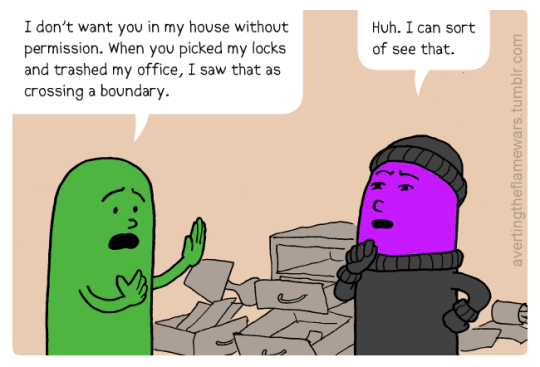
This is… very optional, because it’s often hard and not always safe.
It’s scary to explain how you want to be treated, and scarier to phrase it as a request. There’s emotional risk involved, and no guarantee it will end well. Just lashing out at people can be easier, and can feel a lot more fair.
The question is: what outcome do you want? Asking for kindness has downsides, but it gives you a better chance of getting kindness. Explaining your needs works really well to get people to care about them. When you point out to people that they can choose whether or not to offer you respect and compassion, they usually want to be a person who makes the kinder choice.
Ignore, avoid, block or report those who won’t respect your space when asked.
This can feel super unsatisfying. “Just ignore bullying,” is cliché, condescending advice that rarely works. But it’s cliché because, occasionally, it works really well! And it works more often online than it does on the schoolyard. Curating who you hear from online can wildly alter your experience of reality.
Okay, but what if your problem with a space is more of a… general vibe?
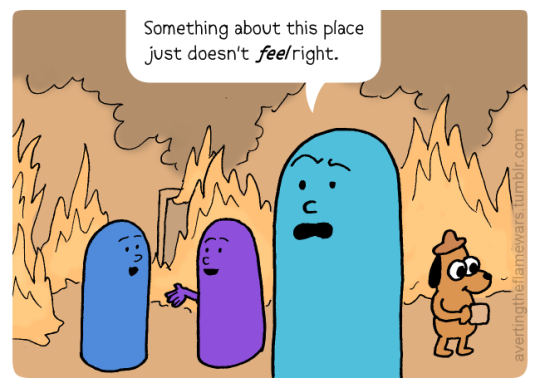
You can’t address that without pinning down the problem.
What kind of interaction do you want to be able to have in this space?
What tends to go wrong when you see someone try to have that interaction?
Maybe a certain type of comment is too taboo, or not taboo enough. It can also be about structure and intention: Who’s an authority in a space, and what do they seem to want for it?
Sometimes it helps to directly question a social rule, hoping that other people in the space dislike that rule as much as you do.

This goes over best if you start by acknowledging the purpose of the rule you’re challenging, and affirming the value of that purpose.
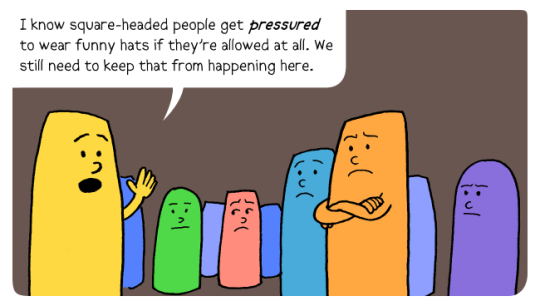
If none of these strategies work, it’s probably time to retreat from the space, or do whatever you judge will work best to protect your own well-being.
You might find that the only way to find your space is to make a new one.
You can start a social media account that only interacts with people who are behaving according to certain rules. Or a blog or forum where you delete any comments that don’t meet with your stated guidelines.
We’d love to see more online spaces with meaningful, explicitly stated social rules. If you create a space that suits your own needs, you might find that others have been longing for the same kind of space as you, without even knowing it.
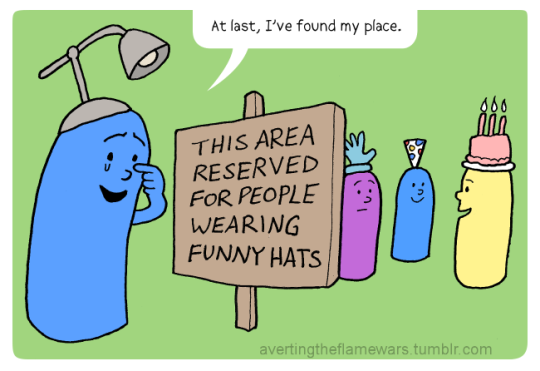
Online Spaces, Part 5: No Space Is Safe For Everyone
The term “safe space” has often meant places that are safe for people in the LGBT+ community. The world and the internet have expanded on the idea, and different web communities have their own notions of what it means to be in a safe space. The phrase still has a strong connotation of protecting a marginalized group, and we’re not sure how universal or exclusive that connotation is.
You can make a space to protect people from a particular kind of bigotry. Or from a kind of hostility or bullying. Or from being caught off-guard by content that can harm them. We like that people have been figuring out ways to protect each other online.
But different types of safety can contradict.
Say you have a safe space for people who need their triggers correctly labelled. That same space can be unsafe for people with disabilities or life situations that make trigger warnings tricky to create. People can have attention issues, or difficulty understanding a warning system, or difficulty making their body or the software do what they want. They may not be fully fluent with the language of a space, or even just the dialect.
Being bad at following a space’s rules is a little unsafe if you have to be on high alert in order to avoid making constant mistakes.
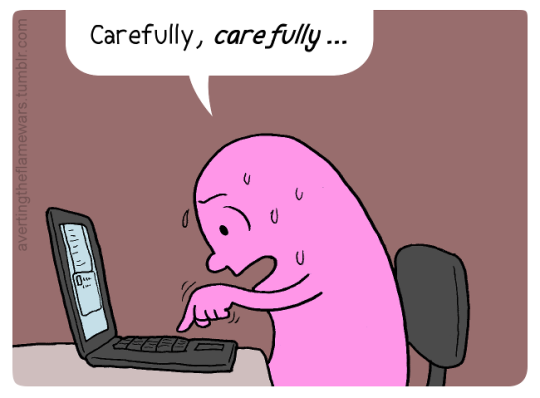
And it can be very unsafe if people respond to mistakes with insults, cruel assumptions, or suggestions of self-harm.
Now, say you have a place that’s safe for people who are processing trauma and anger. It might be unsafe for people who share traits in common with those who inflicted the trauma.

Or it could be unsafe for people who are processing the same trauma in a differentway.
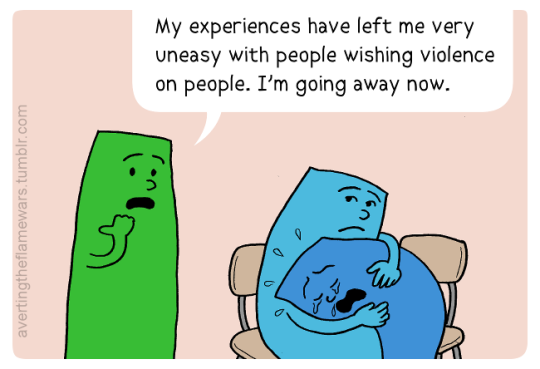
The nature of a space depends on who it’s safe for, and what it’s safe from. It’s only safe if the occupants mostly agree on those two points.
Otherwise, you end up working at cross-purposes.
There’s tension when you try to expand your own type of safe space to encompass a larger community. Suddenly, a lot more people have to mostly agree about who’s supposed to be safe from what.
Sometimes you’ll find that your type of safety is too specific to work in a big space. It’s hard to predict all the needs of a varied community.
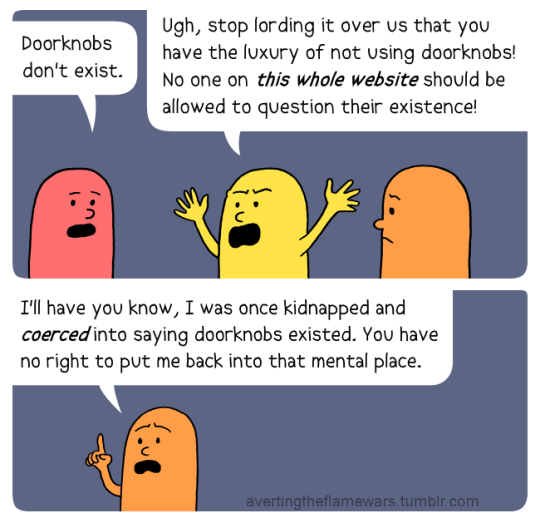
Now, some types of safety do a lot more good than harm even on a large scale. Making a big space safer can be a tense but needed transition.
We here at Averting The Flame Wars want everyone on the internet to be safe from things like public doxing and death threats. But not everyone would agree with that. And even we don’t know exactly how to enforce it.
It’s hard to build a consensus with a large group of people about which rules are worth the trade-offs involved. It’s a struggle between two things:
Freedoms: The safety of being able to talk and act thoughtlessly, to relax and be open about your passions, uncertainties, and experiences.
&
Restrictions: Rules and norms that give people some power over if and how they’re exposed an idea or situation.
These are both types of safety. In general, humans need some of both.
Keeping a space safe means hashing out how you’re going to balance these two needs in lots of different ways.
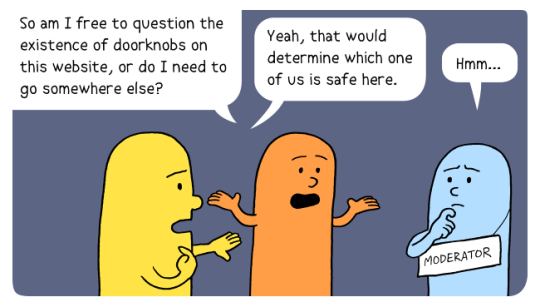
And it means deciding how you can enforce the restrictions you have. If one person breaks the rules, do others get to try to make them feel bad? If so, what methods are they allowed to use?
If you’re going to honor the needs of different humans, you need to change where the boundaries are from one space to another.
It helps a lot if you state the restrictions and freedoms of your spaces as clearly as possible, so the people who need to avoid it can do so. Some Facebook groups have guidelines for their members, and some blogs have guidelines for commenters.
In a more amorphously owned space like a tag, it’s going to be a lot more subjective. Still, if you feel like you know a safe space well, it can help to articulate what you think the rules are.
Likewise, if you sense that a space isn’t intended for you or has unwritten rules you don’t understand, one option is to ask. Ask the people you encounter about who they want the space to cater to.
If they seem receptive, ask if they’d be willing to explain what kind of behavior they expect from you. (Keep in mind that this can be a lot to ask. Most people don’t know how to articulate exactly what they expect from you. And some have bad experiences with being asked the question.)
You can’t preempt every harmful misunderstanding this way. Our ideas can minimize hurt, not prevent it completely.
Safe online spaces are important. And they can be pretty unsafe.
When it comes to things like tags and forums, there’s often a group of people who see themselves as “owning” the space. They might have particular standards that they expect people to meet in order to “own” the space along with them. Things like:
- belonging to a certain demographic
- sharing a specific difficulty
- having certain political beliefs
- liking the thing that the space is dedicated to celebrating
- knowing social skills that may be specific to the space. Like knowing how to use trigger warnings in a particular way, or interacting comfortably with a certain type of humor
This is tricky. It’s rare that everyone who “owns” a space agrees about exactly who owns it or what the etiquette is.
If one person seems to speak for all the inhabitants of a space, it’s hard to know who they really speak for, and who they don’t speak for. It’s extra hard when you really dislike what they’re saying.
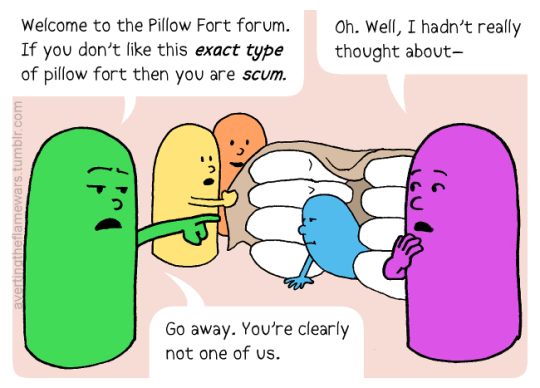
Not knowing who speaks for whom can make hurtful actions feel like they come from a whole group instead of one, or two, or twenty people.
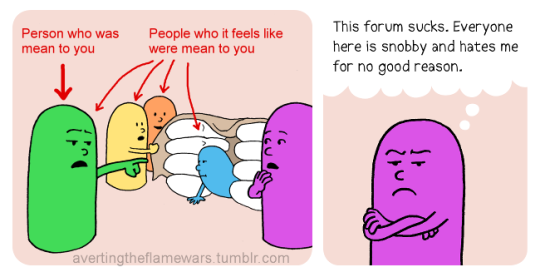
Just because one person is acting badly, it doesn’t mean the whole group would act the same way. It’s possible that the people you encounter are acting extra mean, or aren’t informing you correctly about what the space is for.
Here’s where it gets a little harder: It’s possible that someone you encounter is acting extra mean, and that they’re still correct about what the space is for. They may be trying to protect something everyone values about the space, but be protecting it in an overly aggressive way.
In that situation, you could lash out at one person, only to find that others get caught in the crossfire.
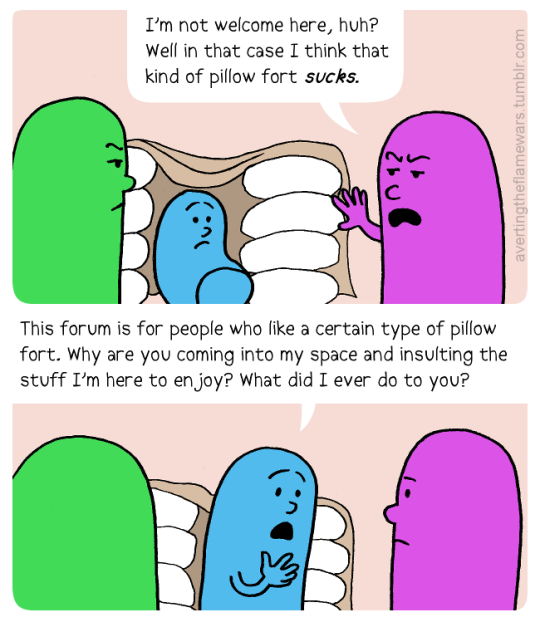
Whatfeels like an equal and opposite reaction doesn’t have an equal impact when an individual and a group argue. Words get separated from their context. People lose track of distinctions quickly as they unconsciously alternate between thinking about what the group believes and thinking about what one group member believes.
And in the middle of all that, online groups tend to have a trickle of new visitors coming in, trying to figure out what’s expected of them.
This is messy and hard. Prepare for people to act poorly from a place of hurt and confusion sometimes. Try not to take it out on innocent bystanders when you’re hurt and confused.
When someone posts on their blog or social media, they sometimes see themselves as being in a public space. So, they expect people to voice disagreement, ask them to quiet down under certain circumstances, or tell them when they’re being very rude.
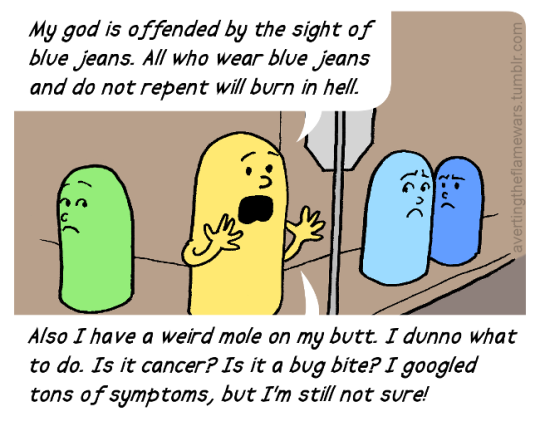
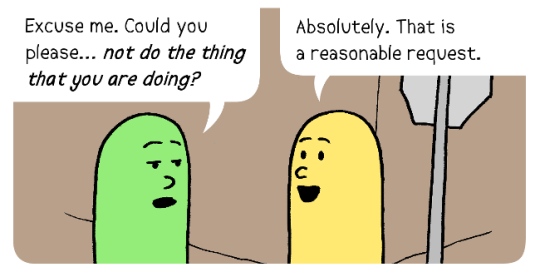
Some people see their posts as a private space. If you join that conversation, you’re opening the door and letting yourself in, and anything you say upon entering will be viewed in that context.

If you’re not sure if you’re welcome in a space, you can always ask permission before joining or starting a conversation. Often, you’ll be treated more warmly because you treated the space as personal to someone else.

Now, people tend to see a space as more public if more people spend time there. This can be disorienting for users whose web pages become popular on the internet, and they find that what used to be a place to tell their friends and family about their thoughts is suddenly… a little less intimate.


When you’re on the internet, there’s no solid way to measure the privacy of a space you are in. So you can’t be totally sure how anything you say will be received. Be careful when you can.
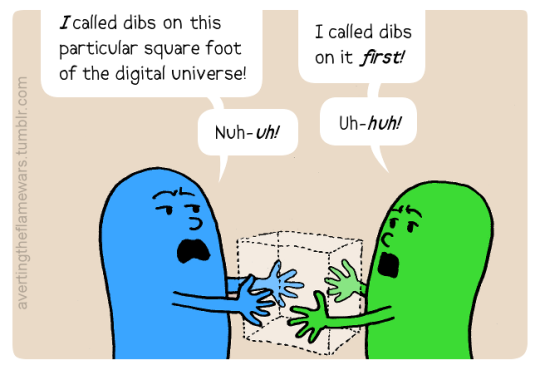
Online Spaces, Part 2: Territorial Disputes
We talked in Part One about how people tend to expect certain things when they’re on their own online territory. But the online community is still figuring out the etiquette around who “owns” which online spaces.
Different types of space overlap. It makes it tough to agree with other people about where your space ends and theirs begins.
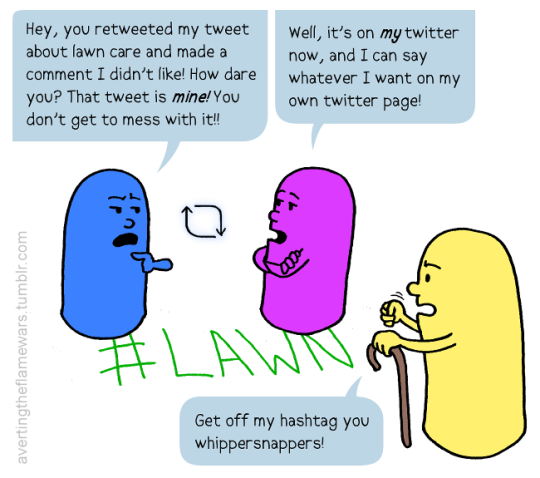
People don’t always agree on who is the rightful occupant of a space and who is the guest. Or burglar. And it’s easy to judge someone’s online behavior through that lens - the belief that they are an intruder.
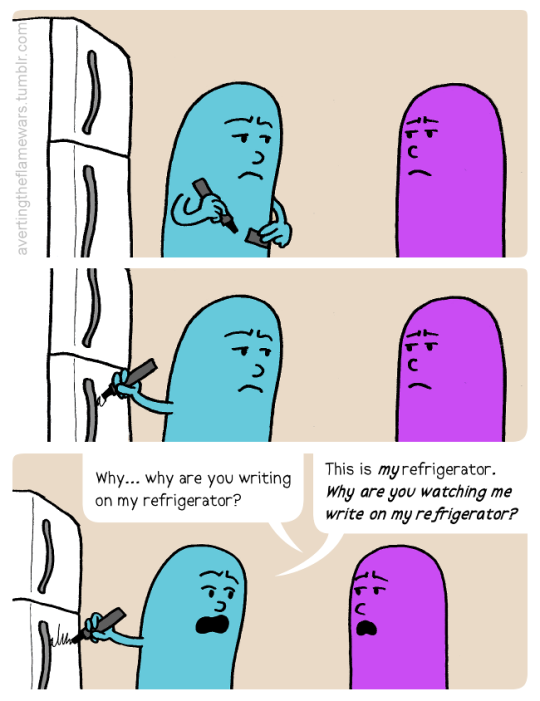
(Of course territorial disputes like this happen in physical spaces. A lot. The internet just adds some extra types of confusion to fight over.)
It can help to explain clearly where you perceive the boundaries of your own space. “I consider this blog to be my own personal space, so I consider it invasive when you comment on it in a certain way,” is much more informative than, “How dare you come here uninvited and act like a total jerk?”
Try to be clear about where you see the lines, and listen for other people’s boundaries. This stuff isn’t nearly as obvious as it sometimes feels.
The internet comes with its own concept of “space.” It’s a newer invention than physical space, and a little trickier to keep track of.
When people talk about a “space” online, they can mean…
- a forum or forum discussion.
- the comment section on a blog, video, or anything else that comes with a comment section.
- a comment chain.
- a website.
- a social media account. This space can “contain” anything that appears on the page, or any messages people send to the account.
- a community of social media accounts.
- a fandom or part of a fandom.
- a hashtag or tag page.
- a listing of retweets, reblogs, or shares on a post. This space can “contain” the comments people have made on the post along its journey.
That’s probably not a complete listing of types of online spaces, but you get the gist.
When someone is in their own “space,” they expect a certain amount of control over what other people say and do there.
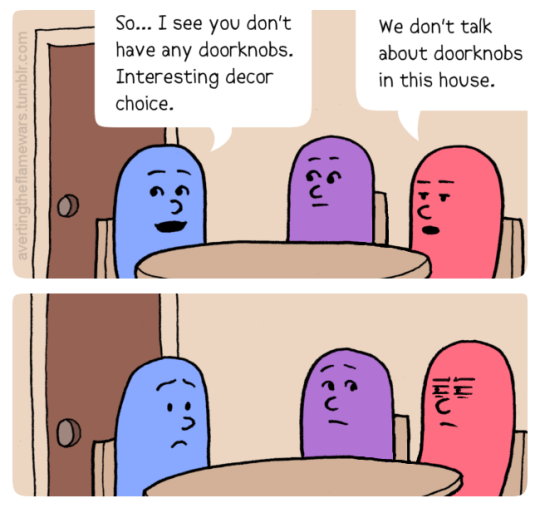
…And, when someone is in their own space, they expect a certain amount of leeway to do and say what they like without being interrogated or told off by uninvited guests.
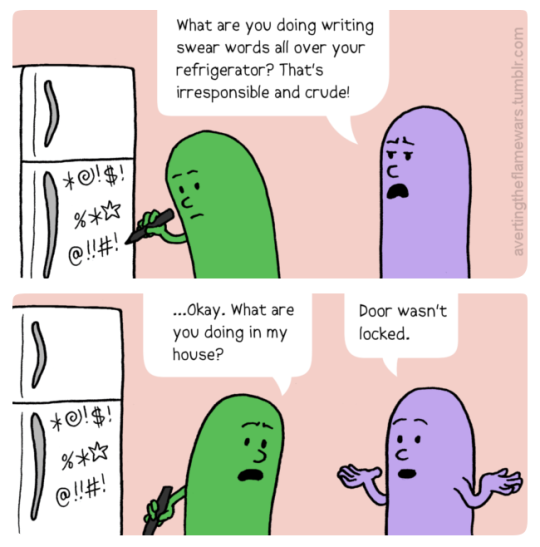
The concept of online space is central to how a lot of web users experience the internet and the people in it, and there’s a lot of disagreement about how it works.
(…but they make good click bait.)
Hi! We’d like to talk to you about “strong statements” – statements that can be shocking, debatable, or oversimplified.

And also about “strong arguments” – which tend to be logical and convincing.

People sometimes use strong statements as if they are strong arguments. But those are different things.
The title of this post is a strong statement. But it would be hard to make a strong argument that the title of this post is true.
“Strong” statements are strong in some ways. They can convey a forceful mood, or catch people’s attention. They can prompt people to be more certain and militant about opinions they already have. They can make people feel obligated to take a side. They can be a shortcut to expressing yourself when you don’t have the time, skill, or energy to use gentle and precise words.
In reality, we just think “strong” statements are less convincing than most people seem to think they are.
Sometimes it seems like because what you have to say is important, you should say it in the strongest terms possible. It can even feel like a moral obligation to speak up for your side forcefully.
Really, it depends on what you want to accomplish. When people hear something that disagrees with their beliefs too much, they tend to dismiss it out of hand.
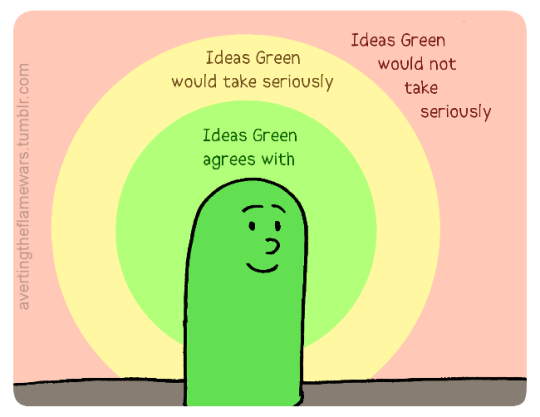
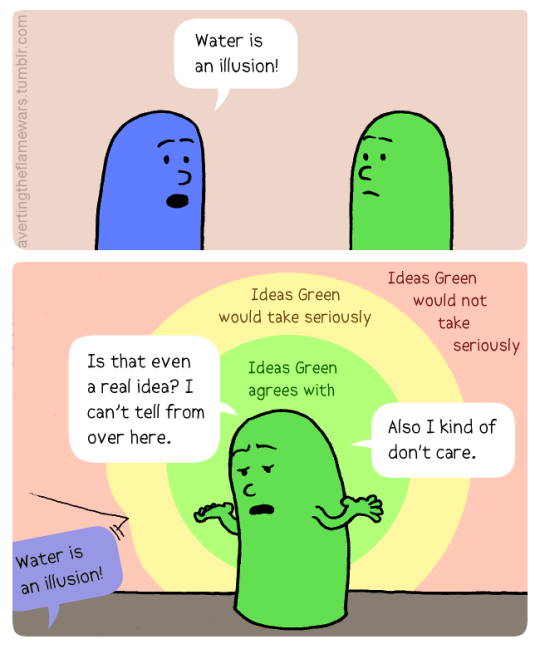
A persuasive statement might be one that is harder for people to dismiss out of hand. Or a statement that the other person technically agrees with, but that has difficult implications for their argument.
Sometimes it’s the most understated or “weak” statements that end up being the most convincing.
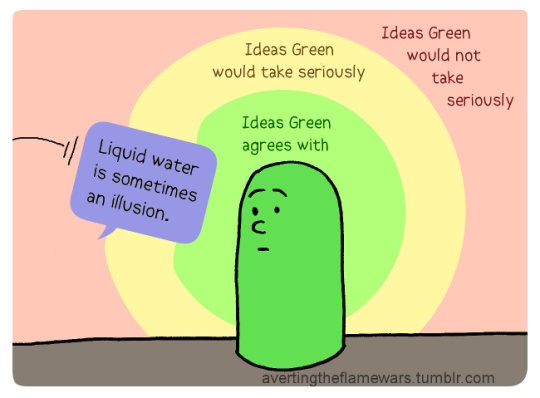

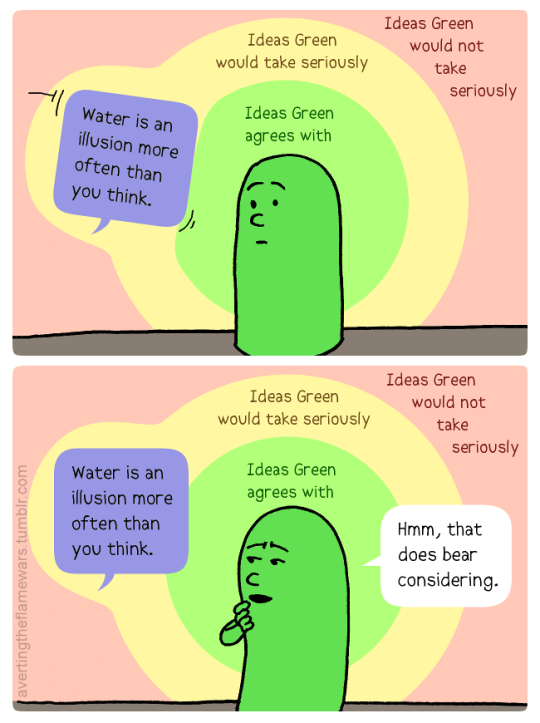
If an idea is true and very important, then getting people to agree with it or think carefully about it is a good thing.
When your main goal is to be convincing, it’s useful to sometimes explain your deeply held beliefs in mild terms. It can make your argument stronger and more difficult to dismiss.
Even when it feels like it’s the other way around.
In online disagreements, it’s easy to feel like you’re the only one making an effort to be nice. Like you’re working hard to talk respectfully, but everyone else keeps sabotaging you.

All people have to do is be a tiny bit civil. That shouldn’t be complicated, right?
The thing is, it’s pretty complicated.
Here are a few examples of how you might try to convey respect in choosing your words:
- empathizing with other people’s thoughts and feelings
- not making assumptions about people’s thoughts and feelings
- avoiding swearing & overly casual language
- avoiding pompous, academically elite language
- being straightforward & honest
- refraining from saying negative things
- carefully avoiding statements with any kind of subtle bigotry
- not walking on eggshells with someone just because you have privileges they don’t
- refraining from logical fallacies and generalizations
- refraining from nitpicking and hair-splitting
See how this can get a little… contradictory? Differences in how you prioritize these things can alienate people who grew up in the same household.
Now imagine folks from radically different social circles, religious backgrounds, and countries, all trying to correctly guess what everyone else will read as respectful. That’s the internet on a good day. We can all work hard to treat each other right, and it can still blow up in our faces.
People on both sides can take measures to de-escalate a conflict, and it can escalate anyway because they perceive the conflict differently.
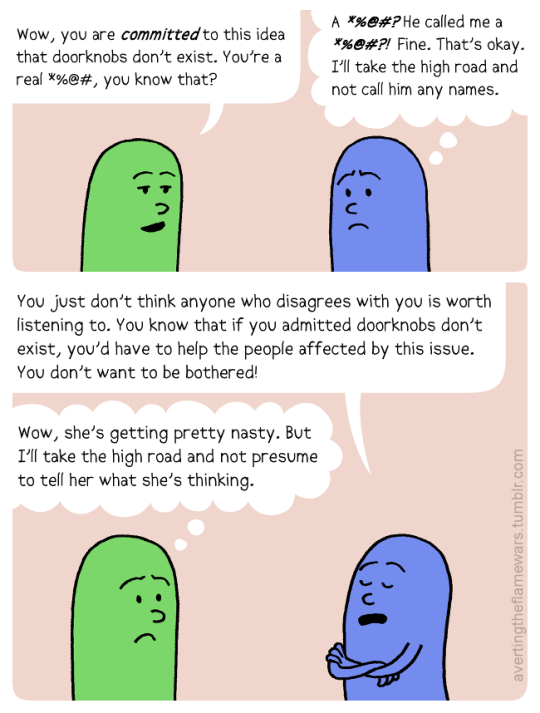
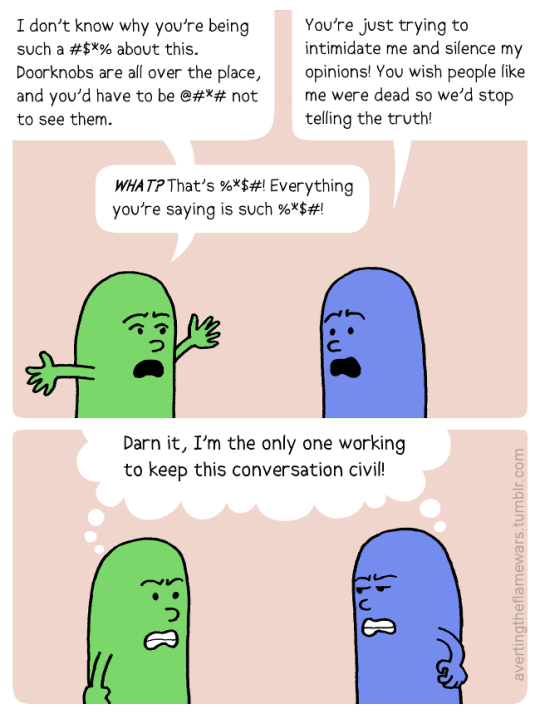
This can leave you feeling frustrated, self-righteous, and put-upon. All dry kindling in the world of flame wars.
It helps to figure out what exactly makes you feel respected. Then you can ask people to treat you the way you want, in a specific and constructive way.
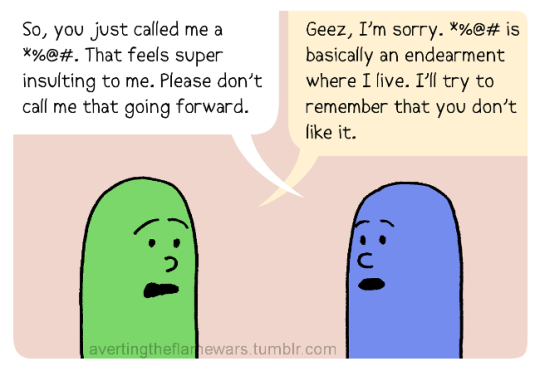
And when you can articulate how you want to be treated, it’s easier to remember that others might want to be treated differently.
Click here to start at the beginning of this series
It’s easy to believe you’re doing good by staying in a conversation when you’re very uncomfortable being there. Or when you know your anger is starting to alter your judgement.
And there’s a little truth to that. It’s super powerful to be willing to spend time talking to people who you disagree with, whose views upset you. It’s the counterweight to groupthink. It opens up lines of communication so you can challenge your own assumptions, and everyone else’s. Being persistent in voicing your opinion is a powerful way to spread it. The more people hear an idea, the more seriously they tend to consider it.
But saying something in the wrong way or in the wrong context makes your point sound less believable, not more.

You can have this effect even if others are arguing with you just as angrily. People can link your views with the antagonism of the conversation, and become biased against them.

…Which makes it that much harder for other people with your beliefs to make themselves heard down the line.
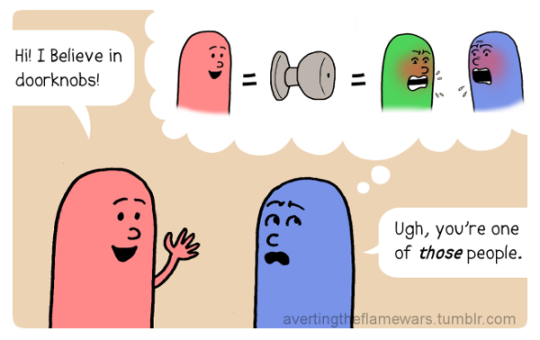
Now, it’s not always fair or logical for people to build these associations. And it doesn’t mean you were overreacting in losing your temper.
It’s just that disengaging from an angry conversation is a super useful skill to have on hand, if you really want other people to take on your beliefs. If you can walk away promptly when you or others start to get upset, you leave room for someone else to build on that conversation another day.
You also leave room for the other person to consider the ideas you’ve presented on their own terms, in their own time.

When you’re changing someone’s mind over the internet, you almost never get to see that you’re doing so. People rarely overturn an opinion they care about in the span of a single conversation. It’s something that happens in the privacy of someone else’s mind, as they gradually sift through what you’ve said, and how it lines up with their past experiences and beliefs.
You walking away can be one of the first steps in the process of changing someone else’s mind – because it’s the someone else in that situation who does the central work of changing their own beliefs.
How and when you walk away can make a big difference in how likely they are to succeed.
Sometimes you’ll want to write your farewells when you leave a conversation.
It might be to let people know not to direct further conversation to you, or so you have something to hold yourself to when you’re tempted to re-enter the discussion.
If you’re leaving a conversation that has gotten tense, it can make your departure easier all around if you avoid putting forth arguments or criticisms on your way out.
Now, depending on the quality of the discussion when you opt out of it, people might gloat or judge you for disengaging from it. It can feel like you’re surrendering by leaving.
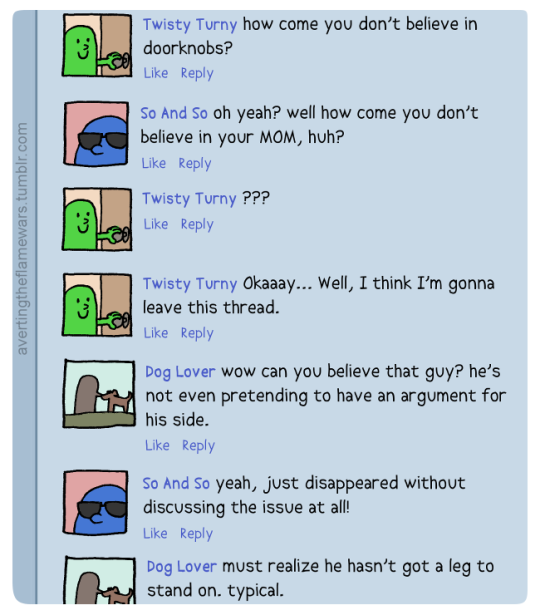
But if leaving means that the other person has won, then the concept of winning an argument is pretty ridiculous.
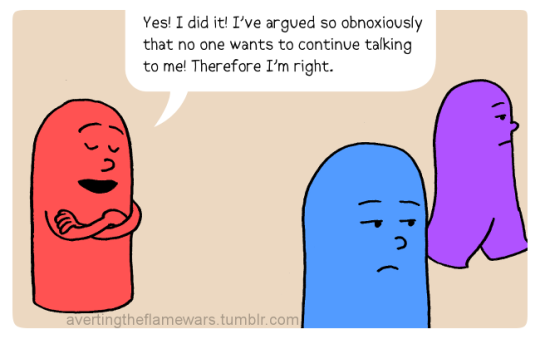
Sometimes the argument is happening in a place you think of as your turf – like a tag you’re only used to sharing with a small group of people, a post you made, or even your messaging inbox. That makes it harder to leave, because you might need the people you’re arguing with to cooperate with you in dropping the discussion.
So, start by asking. Say something like, “Hey, I’m ready to stop having this conversation. Would you be willing to take it somewhere else?”
or, “I’m pretty burned out on this topic. Please don’t tag me or message me about it going forward.” Build the skill that is gently and persistently asking for space when you need it.
If repeated requests to end the conversation don’t work, try blocking the other person. Or if the website you’re on allows, block keywords related to the topic. If you can ignore someone entirely, that’s good too. They may get bored and go away.
They also might not.
If you can’t ignore someone, and they’re not responding to your requests to be left alone, that makes it pretty hard not to jump straight back into arguing aggressively on the topic you’re trying to drop.
When circumstances make it hard or impossible for you to avoid a person, you can always focus on continuing to make it clear that you’re done discussing the topic.
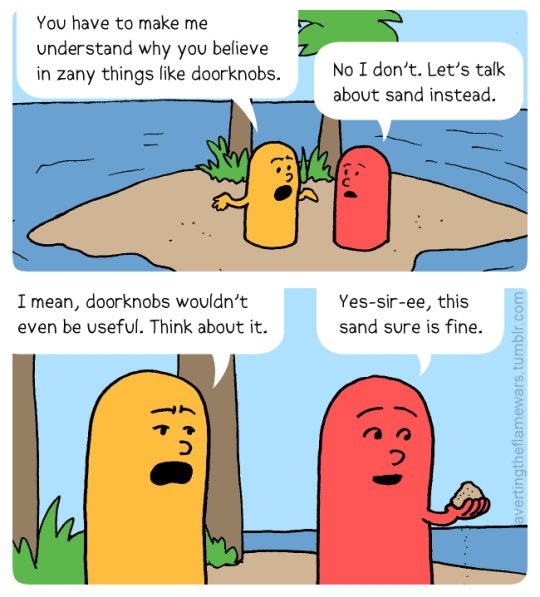
There’s a limit to how much you can do get others to leave you alone. But the more times and ways you can express your wishes without escalating a conflict, the better your chances are of being heard.
